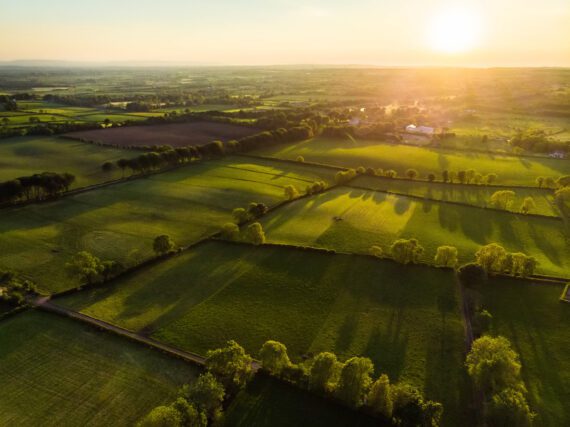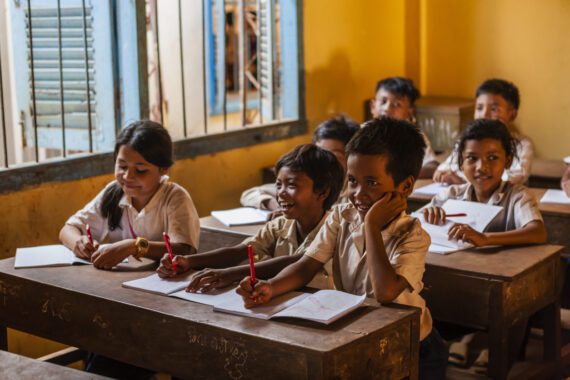
As Christians from Africa, Europe, the Caribbean, and North America, we share a fierce resolve to stand and work together to end the hunger crisis made worse by climate instability, to renew God’s creation, and to bring our planet into balance, forming a beloved community in which all of creation can thrive. Climate justice is our means for furthering this resolve.
The Earth is the Lord’s, and the fulness thereof; the world, and they that dwell therein. (Psalm 24:1)
We lament:
- that many of us experience hunger, loss of shelter, loss of livelihood, poor health, environmental injustice, forced migration, fear, and distress due to climate shocks;
- that healthy diets are unaffordable for almost 3.1 billion people – 40% of the world population;[1]
- that more than 100 million people are forcibly displaced – 1 person in every 78 on Earth;[2]
- economic systems that exploit the land and vulnerable people in mostly low-income communities for the benefit of the few;
- a planet that is wildly out of balance, with the number of weather and climate related disasters increasing fivefold over the last 50 years[3]: supercharged hurricanes, severe drought, prolonged and intensifying waves of heat, massive floods, acidifying oceans, melting glaciers and polar ice caps, and rising seas;
- the creatures and life-systems that have been and are being decimated, and the web of life that is unraveling before our eyes.
We confess:
- that the extreme patterns of living and livelihoods of some of us cause the extreme suffering of our brothers and sisters: 10% of the world’s wealthiest individuals are responsible for around half of global greenhouse gas emissions;[4]
- that some of us experience the impact of these extremes more than our brothers and sisters do: namely, people disproportionately affected by historic inequities that are also racialized, women and children, and those living in the Global South;
- that Christianity has too often been complicit in the exploitation of the Earth and our fellow human beings and that we have repeatedly ignored the fact that Biblical justice and righteousness are central to our identity as Christians;
- that too many Christians have ignored the findings of climate science, have failed to recognize how climate-fueled extreme weather severely harms our brothers and sisters and increases hunger, and have failed to recognize the urgency to act and address the climate emergency.
Prayer for Repentance
O God, our Creator, turn us away from the patterns of this age that include patterns of domination, overconsumption, individualism that ignores the common good, commodification, exploitation, and othering. May we heed your wisdom and the wisdom of our ancestors, our bodies, and your whole creation. Give us strength to turn toward ways of love, trust, reconciliation, justice, and grace. Amen.
To address the hunger crisis made worse by climate change, we draw from the wellsprings of our Christian faith. We affirm the intrinsic goodness of the world that God created (Genesis 1). We recognize that the first task that God entrusted to human beings was the responsibility to care for God’s creation (Genesis 2:15). God’s love embraces not only humanity but also the rest of creation (Genesis 9:8-17). Jesus gave his life for the whole world, so that all things could be reconciled (Colossians 1:15-20; Ephesians 1:10; 2 Corinthians 2:19). The power of God’s Holy Spirit renews the face of the Earth (Psalm 104:30) and makes all things new (Revelation 21:5).
Jesus taught us to find him among “the least of these” (Matthew 25:31-46). We recognize Christ’s suffering presence in the communities hurt first and hardest by climate change: those without adequate means to flourish, the historically underserved, and those least likely to have a voice at the table where policy decisions are made – the very people who suffer disproportionately even as their contribution to global emissions is almost negligible. We also recognize Christ’s liberating, life-giving presence in the individuals and communities who refuse to settle for a killing status quo and who rise up to affirm the dignity of all people and the sacredness of Earth.
Guided by the Spirit given to us in Jesus, we regard the climate emergency as not only a socio-political and economic challenge, but fundamentally as a spiritual and moral summons to all people of faith and good will – including Christians – to participate in the growing worldwide movement to restore reverence and justice for Earth and all her communities – human and other-than-human.
Before God, we commit ourselves to share in Christ’s mission to reconcile us to God, each other, and the rest of God’s creation.
Prayer of Commitment
Gracious God, we pray for people who benefit from – and people who suffer from – unjust systems that exploit human labor and plunder the Earth. Make us bold to stand together as Resurrection people. Empower us to step out of fear, despair, and inertia and to join – and lead – the joyful, justice-seeking, Spirit-led, unstoppable movement to make a swift and just transition to clean, renewable energy, to support vulnerable communities, and to safeguard the world that you entrusted to our care. Amen.
Call to Action
African faith leaders have invited faith leaders from high-income countries in Europe and North America to come alongside them with policies that align in establishing climate justice and ending hunger. Together, we seek public policies that yield measurable results and meaningful change for those disproportionately affected by hunger and climate change. We recognize that high-income countries have historically been the highest emitters of greenhouse gas emissions and have strategic roles to play in ending the dual hunger and climate crisis. This informs our demands for the following actions:
For All Parties at COP27
- The Adaptation Fund, and other climate justice funding mechanisms, must conform to evidence on gender and accessibility and embed Locally Led Adaptation Principles in their processes.
- Stop the politicization of climate change discourse, which is killing people around the world; accept the moral urgency of addressing the climate crisis with ambition, equity, and resolve.
For Governments and Decision Makers in the North
- Fulfill all milestone commitments made by those responsible for polluting the planet and invite the initiatives that build on these commitments.
- Fulfill the promise to mobilize $100 billion annually to fight climate change.
For Government and Decision Makers in the South
- Environmental policies, action plans and Nationally Determined Commitments should be formulated in ways that guarantee economic and ecological justice and should be fully implemented.
- Create a policy and legislative environment that enables smallholder farmers to fully utilize all available climate change adaptive measures to address food insecurity.
For the Private Sector
- Prioritize community and environmental health and sustainability in all its practices and move beyond a rigid focus on profit-making.
- The private sector must be responsible partners in addressing the climate crisis and loss and damage, and must advance practices that heal, rather than perpetuate, historic inequities.
For Young People of Faith
- The time for action is now! Young people will inherit the Earth that older generations bequeath them. We urge older generations to leave a healthy, habitable planet for those who come after.
- We celebrate youth leadership in climate activism, and we call for ecumenical unity as old and young stand together to advocate for a safe and healthy world.
For Church Leaders, Faith Communities and Faith-based Actors
- Biblical teachings, guided by church teachings, inspire, empower, and motivate us to love each other and creation with passion and to prioritize environmental action in our faith communities and our everyday lives.
- As Christians who confess and lament our past unfaithfulness and who are determined to seek climate justice for God’s whole creation, we urge all Christians and all people of faith and good will to join us in taking bold action to restore the Earth.
Signatories
| Names | Organizations |
|---|---|
| Rev. Eugene Cho | Bread for the World |
| Rt. Rev. Arnold Temple | President, All Africa Conference of Churches |
| Dr. Steven Nabieu Rogers | Africa Faith and Justice Network |
| Dr. Nigussu Legesse | Consortium of Christian Relief and Development Association |
| Mary Concepter Obiero | Church World Service |
| Fr. Zulu Philemon | Caritas Monze, Zambia |
| Rev. Dr. Onifade Testimony 0.0. | Nigeria Baptist Convention EDAPI ngo |
| Rev. Nicta Lubaale | Organisation of African Instituted Churches |
| Siame Likobama Gertrude | Caritas Africa |
| Bishop Kortu K. Brown | Apostolic Pentecostal Church Church Aid Inc. |
| Rev. Wesley Litaba Wakunuma | Caritas Zambia |
| Rev. Dr. Kehinde Babarinde | National Director. Education. Dialogue. and Value System Initiatives |
| John Amisi | OAIC Farmer Resource Person |
| Tolbert Thomas Jallah Jr. | Faith and Justice Network |
| Andrew Musgrave | Archdiocese of Cincinnati |
| Alice Tlustos | Care of Creation Inc Care of Creation Tanzania |
| Rev. Feleke Tibebu Weldesemaiat | Ethiopian Evangelical Church M.Y. Central Ethiopia Synod |
| Wendy Gist | Presbyterian Church (USA) |
| Fredrick Njehu | Tearfund |
| Koni Patrick Bugu | Peace Program Officer. Church of the Brethren in Nigeria |
| Maureen Bahati | Livelhoods Officer. Organisation of African Instituted Churches |
| Rosemary Wilfred | Communication & Advocacy Manager. Tearfund South Sudan |
| Elias Kamau | Country Director – Kenya, World Relief |
| Rev. Dr. Mark McReynolds | A Rocha USA |
| Neo Michael Mosima | Climate YES |
| Ebun James-Dekam | The Council of Churches in Sierra Leone |
| Katlego Mohuba | World Council of Churches Ecumenical Advocacy Alliance Food for Life |
| Dr. Manoj Kurian | World Council of Churches Ecumenical Advocacy Alliance Food for Life |
| Pastor IBUCWA LIPAN DA Jean-Pierre | TRAFFED-RD.CONGO (Travail en Reseau avec les Federations des Femmes et Enfants en Detresses) |
| Caroline Pomeroy | Climate Stewards |
| Moses Sabao | Zambia Youth Environmental Network |
| Liko Qokela | Climate YES Green MAGIS SAP Climate Champions MAGIS |
| Tonderai Muzhinji | Zimbabwe Environmental Care Network Green Anglicans Movement Climate YES |
| Christian Wamalwa Timbe | |
| Rev. Dr. Jessica Moerman | Vice President, Science & Policy, Evangelical Environmental Network Co-Founding Pastor, Grace Capital City |
| Rev. Ronald A. Nathan | African Methodist Episcopal Zion Church Evangelical Association of the Caribbean Black Majority Churches’ Climate Justice Group, Christian Aid U.K. |
| Dr. Dorcas Chebet | Pwani University |
| Shawn McCabe | |
| Busiswa Dlamini | Hlumisa Climate YES |
| Michael Lee | Encounter Church |
| Rev. Dr. Angelique Walker Smith | Bread for the World World Council of Churches Pan African Women of Faith Pan African Young Adult Network Africans & African Diaspora (AA) Ecumenical Advocacy Alliance Food for Life |
| Rev. Sarah Robinson | Audobon Park Church |
| Jacob Mwanduka | Watersheds Ecosystem Conservation (WEC USA) |
| Norah Tariro Magaya | The Green Church Movement Climate YES Zimbabwe Environmental Care Network |
| Jennifer Muthoki Mutua | Malizingira Climate Movement |
| Mandisa Gumada | Green Anglicans Climate YES |
| Teboho Bino Makhalanyane | Green Anglicans |
| Rev. Dennis Nthenge | Green Anglicans Malizingira |
| Kevin Maina Wanjav | St. Paul’s University |
| Muyunga Brian | St. Paul’s University Students· Association |
| Rev. Dr. Margaret Bullitt-Jonas | Missioner for Creation Care, Episcopal Diocese of Western Massachusetts & Southern New England Conference, United Church of Christ Creation Care Advisor, Episcopal Diocese of Massachusetts |
| Emmett L. Dunn | Executive Secretary/CEO, Lotty Carey Convention |
| Fr. McDonald Nah | Caritas Africa |
[1] The State of Food Security and Nutrition in the World 2022: https://www.fao.org/publications/sofi/2022/en/
[2] UNHCR data in displaced populations: https://www.unhcr.org/refugee-statistics/insights/explainers/100-million-forcibly-displaced.html
[3] WMO news report 31 August 2021, https://public.wmo.int/en/media/press-release/weather-related-disasters-increase-over-past-50-years-causing-more-damage-fewer
[4] SEPTEMBER 2020 Stockholm Environment Institute & Oxfam The Carbon Inequality Era: An assessment of the global distribution of consumption emissions among individuals from 1990 to 2015



